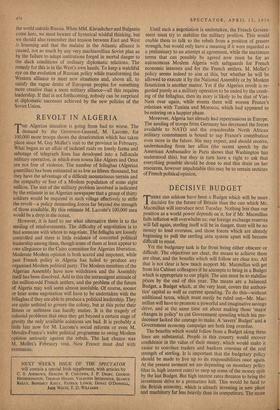REVOLT IN ALGERIA
TItn Algerian situation is going from bad to worse. The demand by the Governor-General, M. Lacoste, for 100,000 more troops shows the deterioration which has taken place since M. Guy Mallet's visit to the province in February.
What began as an affair of isolated raids on lonely farms and sabotage of telegraph lines has developed into a full-scale military operation, in which even towns like Algiers and Oran are not free of violence. The number of fellaghas (Algerian guerrillas) has been estimated at as low as fifteen thousand, but they have the advantage of a difficult mountainous terrain and the sympathy or fear of a Moslem population of some eight million. The size of the military problem involved is indicated by the estimate in an Algerian newspaper that a group of thirty soldiers would be required in each village effectively to stifle the revolt—a policy demanding forces far beyond the strength of those available. By this estimate M. Lacoste's 100,000 men would be a drop in the ocean.
However, it is hard to see what alternative there is to the sending of reinforcements. The difficulty of negotiation is to find someone with whom to negotiate. The fellagha are loosely controlled and there is little evidence of concerted political leadership among them, though some of them at least appear to owe allegiance to the Cairo committee for Algerian liberation. Moderate Moslem opinion is both scared and impotent, while past French policy in Algeria has failed to produce any organised Moslem political party. The Moslem members of the Algerian Assembly have now withdrawn and the Assembly itself has been dissolved. Add to this the intransigent attitude of the million-odd French settlers, and the problem of the future of Algeria may well seem almost insoluble. Of course, sooner or later some negotiation will have to be undertaken with the fellaghas if they are able to produce a political leadership. They are quite unfitted to govern the colony, but at this point their fitness or unfitness can hardly matter. it is the tragedy of colonial problems that once they get beyond a certain stage of gravity the only available solutions are bad. It is probably a little late now for M. Lacoste's social reforms or even M. Mendes-France's wider political programme to swing Moslem opinion seriously against the rebels. The last chance was M. Mollet's February visit. Now France must deal with extremists. Until such a negotiation is undertaken, the French Govern- ment must try to stabilise the military position. This would enable them to talk to the rebels from a position of greater strength, but would only have a meaning if it were regarded as a preliminary to an attempt at agreement, while the maximum terms that can possibly be agreed now must be for an autonomous Moslem Algeria with safeguards for French economic interests and for the French settlers. M. Mallet's policy seems indeed to aim at this, but whether he will be allowed to execute it by the National Assembly or by Moslem fanaticism is another matter. Yet if the Algerian revolt is re- garded purely as a military operation to be ended by the crush- ing of the fellaghas, then its story is 'likely to be that of Viet- Nam over again, while events there will worsen France's relations with Tunisia and Morocco, which had appeared to be entering on a happier phase.
Moreover, Algeria has already had repercussions in Europe. The sending of troops from Germany has decreased the forces available to NATO and the considerable North African military commitment is bound to sap France's contribution even more in the future. She may expect, and should receive, understanding from her allies (the recent speech by the American Ambassador in Paris shows that Washington has understood this), but they in turn have a right to ask that everything possible should be done to end this drain on her resources, however unpalatable this may be to certain sections of French political opinion.










































 Previous page
Previous page